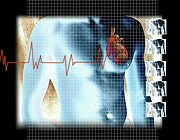CTCA alters diagnosis, testing, tx for patients with suspected angina due to coronary heart disease
MONDAY, March 16, 2015 (HealthDay News) — For patients with suspected angina due to coronary heart disease, computed tomography coronary angiography (CTCA) is associated with changes in diagnosis and management, according to a study published online March 15 in The Lancet. The research was published to coincide with its presentation at the annual meeting of the American College of Cardiology, held from March 14 to 16 in San Diego.
David E. Newby, M.D., Ph.D., from the University of Edinburgh in the United Kingdom, and colleagues examined the impact of CTCA on diagnosis, management, and outcome in patients with suspected angina due to coronary heart disease. Participants, aged 18 to 75 years, were referred to a secondary care cardiology clinic for the evaluation of suspected angina due to coronary heart disease. Following initial clinic consultation, 4,146 participants were randomized to receive standard care or standard care plus CTCA.
The researchers found that, at baseline, 47 percent of participants had a diagnosis of coronary heart disease and 36 percent had a diagnosis of angina due to coronary heart disease. At six weeks, among those undergoing CTCA, the initial diagnosis of coronary heart disease was reclassified in 27 percent and the initial diagnosis of angina due to coronary heart disease was reclassified in 23 percent, compared with reclassification in 1 percent for each of these diagnoses among those who received standard care alone. Alterations in plans for subsequent testing occurred in 15 percent of patients receiving CTCA and 1 percent of those receiving standard care alone. A change in treatment was seen in 23 and 5 percent, respectively.
“What was very clear from the findings is it can help guide which test to do next, which procedures or drugs to give, and ultimately help prevent heart attacks,” Newby said in a statement.
Several authors disclosed financial ties to Toshiba Medical Systems and/or companies producing contrast media.
Copyright © 2015 HealthDay. All rights reserved.








